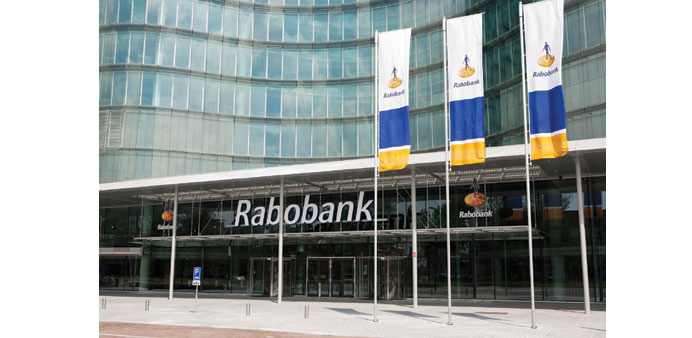Rabobank plans to reduce the amount of home and business loans on its books by as much as €150bn by 2020 in preparation for tougher European capital rules
Bloomberg
Amsterdam
Rabobank Group, the Netherlands’ biggest mortgage lender, is in talks to sell home loan packages of at least €1bn ($1.1bn) each to Dutch pension funds and insurers amid a plan to shrink and cut costs.
“Our mortgages are our crown jewels,” Rogier Everwijn, the head of capital and secured products at the Utrecht-based bank, said in a December 11 interview. “We really don’t want to hold conversations for anything less than €1bn.” The sales will probably be agreed in the first half of next year, he said.
Rabobank plans to reduce the amount of home and business loans on its books by as much as €150bn by 2020 in preparation for tougher European capital rules, the bank said December 9. The closely held lender, which had assets of €675bn at the end of June, is trying to cut costs as customers switch to mobile and Internet banking services.
“We’re expecting the first wave of asset sales to be far more on the mortgage side,” chairman Wiebe Draijer said in an interview at Rabobank’s headquarters in Utrecht on December 10. “The next step is to make coherent packages with homogeneous risk profiles for commercial loans.”
Draijer, a 50-year-old former McKinsey & Co partner who took over as Rabobank chairman last year, also plans to cut 9,000 jobs over the next three years. The bank may securitise more of its assets or act as an adviser to enable peer-to-peer lending, allowing it to continue servicing corporate clients without increasing the size of its balance sheet, he said.
“There has been some thinking about how to make this bank more profitable for a long time now,” Guillaume Lucien-Baugas, a banking analyst at Moody’s Investors Service, said by phone. “The reduction is to be seen in the context of making it quicker to react to new regulation and more profitable going forward.”
While the lender has packaged and sold smaller tranches of its older mortgage portfolios in the past, the sale of as much as 22% of its balance-sheet assets is unprecedented for Rabobank. Holding long-term mortgages is less attractive for banks because of possible capital regulations from the Basel Committee on Banking Supervision, Corne van Zeijl, who manages €1bn on behalf of Actiam, said by phone.
“Insurers and pension funds have more need for those kinds of mortgages,” Van Zeijl said. “It makes a lot of sense for banks to originate mortgages and then sell them through to insurers and pension funds. You will see that happen with a lot more frequency.”
Long-term mortgages with higher yield provide the pension funds with much-needed spread, he said.
Two of the world’s largest pension funds reside in the Netherlands, Stichting Pensioenfonds ABP and Stichting Pensioenfonds Zorg en Welzijn.
ABP had €356bn in assets managed at the end of June, while PFZW oversaw about €186.6bn. NN Group, Aegon, Delta Lloyd, ASR Nederland and Achmea are the biggest Dutch insurers by collected premiums.
The European Central Bank sought in September to buy as much as €597mn of Dutch mortgage bonds from investors, including notes secured by loans originated by units of Delta Lloyd and ING Groep.

